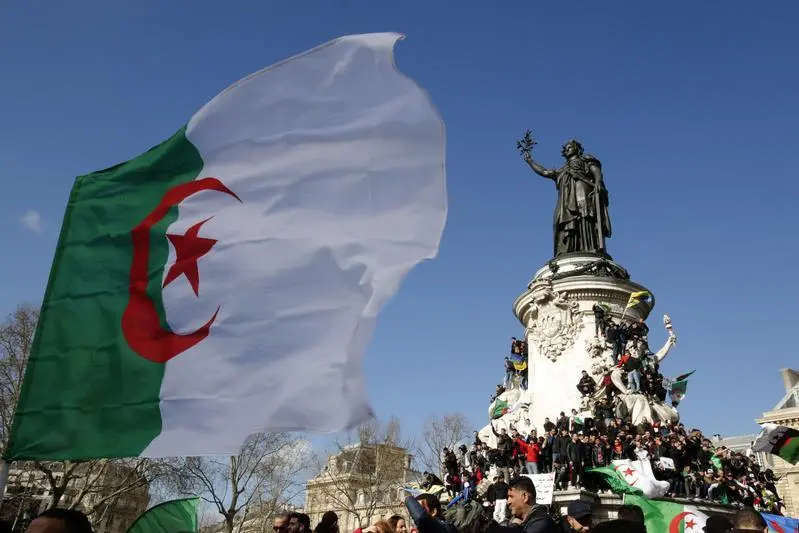PHOTO
A month ago, Algeria’s ruling party, the FLN, voted to stay the course and picked President Abdelaziz Bouteflika as its candidate to run for a fifth term — but a great deal has unfolded in that timeframe to bring the viability of the 82-year old leader into question.
The 2011 Arab Spring largely bypassed Algeria, but similar ingredients that triggered those uprisings — half the population being under 30, youth unemployment at 29 percent, and underinvestment in development — are what is prompting protests in the North African country.
There is also a significant generational shift underway in the country. Most of those who have taken to the streets of Algiers are young enough not to have experienced the shock of civil war in the 1990s that help usher Bouteflika to power. This generation, it seems clear, does not want to go with “business as usual” by keeping in power a president who suffered a stroke in 2013, is confined to a wheelchair and spends much of his time outside the country.
Bouteflika — sensing these protesters have more fuel to burn — offered to step down in one year if re-elected. With the party’s iron grip on power, there is so far no viable opposition nor a successor within the FLN that can relate with the protesters seeking change.
Those who lived through the bloodshed of war do not want to see a repeat of the upheaval that gripped Algeria, but seasoned observers of the country and its recent past have taken note that the military brass, the gatekeepers of stability, have stayed on the sidelines, letting this younger generation have its say.
The same can be said for Europe and the US. So far, official statements have been limited. France, with its historical ties and a large business presence on the ground, conveyed its position through a Foreign Ministry statement saying, “It is up to the Algerian people to decide on whom it chooses as its leaders and up to the Algerian people to decide on its own future.”
While this domestic scenario plays out, one cannot overlook the outsized role that Algeria continues to serve as a strategic energy provider to Europe and as a stalwart in the fight against Daesh in North Africa.
The country sits on just 12 billion barrels of proven oil reserves, but produces a respectable 1.5 million barrels a day. It is a bigger player in the natural gas arena. Stated reserves are only 2.2 percent of the global total — small in comparison to the US, Russia, Iran and Qatar — but state energy giant Sonatrach supplies more than half of Spain’s energy needs and over 15 percent of total supplies to both Italy and Portugal. For those who know the geopolitics of European energy, Algeria is a reliable counterweight to Russia’s dominance over the market.
But energy strategists know it could have done a great deal more. Algeria was squeezed financially during the 2008-2009 global financial crisis and then during the collapse in oil prices in 2014, which clobbered Middle East producers and the sector overall.
To appease his population, Bouteflika spent as if oil was still averaging $100 a barrel. Forex reserves have been tumbling — given high government spending on handouts and subsidies — going from $178 billion back in 2014, to below $100 billion today.
Thus, much-needed investment in infrastructure has fallen by the wayside. While on assignment to Algiers in 2016, one could see the potential for tourism development with stunning architecture with Arab, Berber, French and Spanish influences and kilometers of white sandy beaches on the Mediterranean Sea. It is the region’s best-kept secret but unfortunately to the detriment of the Algerian people, who have grown restive and need jobs.
It is a similar narrative in the country’s energy sector. According to the Oxford Institute for Energy Studies, domestic demand growth averaged over 4 percent a year for a decade, but supplies declined during the same period due to lack of investment. Algeria has plenty of partners — with European heavyweights BP, Engie and Total of France, Cepsa of Spain and Norway’s Equinor still active in the country. However, the number of projects managed solely by Algeria’s Sonatrach outnumber those with international partners by a factor of nearly 2-1, which is not a great indicator of welcoming foreign investment.
Top-line economic numbers provide a similar narrative. Growth was a feeble 0.8 percent in 2018, with a double-digit budget deficit and a breakeven price for oil to balance their state budget pegged at $105 a barrel according to the IMF.
Algeria’s economy needs reforms and investment — the two go together — and today a new generation in the country is taking to the streets saying “business as usual” will not do.
• John Defterios is CNN Business emerging markets editor and anchor based in Abu Dhabi.
Copyright: Arab News © 2019 All rights reserved. Provided by SyndiGate Media Inc. (Syndigate.info).





















